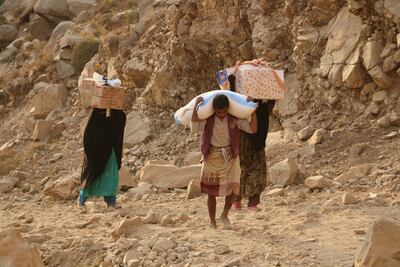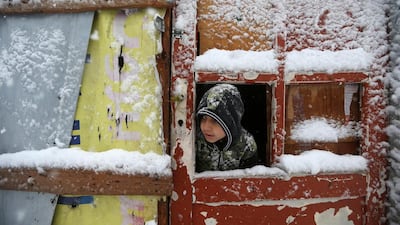In Yemen, where the Houthis are known to have siphoned swathes of humanitarian aid, the UN and other NGOs are often accused of being part of the so-called "war machine" through their continued assistance.
"If you don't intervene at all, the whole population might die, and if you intervene you'll be criticised because part of the assistance hasn't reached its target. It's an ethical dilemma," Khaled Khalifa, UN High Commissioner for Refugees' representative to the GCC, told The National on Monday.
"It's very controversial and there isn't a 100 per cent right or wrong answer, but this is the nature of conflict."
Mr Khalifa was speaking on the sidelines of an event in Dubai's International Humanitarian City, as a coming winter campaign by the Refugee Commission is targeting 3.4 million displaced Iraqis and Syrians in the region.
Yemen is in its eighth year of war since the Houthis took over the capital Sanaa in 2014.
The Houthis now control territory that is home to almost 70 per cent of Yemen's population, of which 73 per cent relies on aid.
"We cannot deny [the Houthis'] existence," a UN aid worker told The National. "They're the ones providing us with security and the ones on the field. Some of the food portions are directed to the front lines. If it's just fraction, some say, let it be." The aid worker declined to be named because he was not authorised to speak to the media.
Yemen has the world's largest population of internally displaced people at 4.3 million.
In 2020, the UN said it was planning to scale back assistance to Yemen after complaints by major donors about the militants obstructing the delivery of aid.
"Aid should be free of any political restraints, it should be impartial and it should be needs-based," UN spokesman Stephane Dujarric said at the time.
Mr Khalifa, who teaches seminars on humanitarian ethics and is a senior adviser to the High Commissioner on Islamic Philanthropy, said efforts were often made to limit the severity of misuse.
"We try everything possible to limit this scenario and make sure that 100 per cent of assistance reaches its target or that the diversion is completely limited."
In general, Mr Khalifa says ethical questions such as whether aid prolongs conflict, or whether organisations should accept donations from warring parties, are ones that the humanitarian system "have not resolved until now".
"If we operate in a conflict area we have to be ready to make those ethical decisions and to defend them," he said.
Two years ago, the number of forcibly displaced people across the world stood at 89.4 million. That number has risen to 103 million and is expected to go up again next year.
Less than 20 per cent of refugees live in tents, Mr Khalifa said.
"Nobody should expect people to live in a tent for 10 years [regardless of] whether it's waterproof or weatherproof," he said, adding that cost was a "huge challenge" when it comes to upgrading these shelters.
The limited resources mean decisions have to be made on whether to cut food rations and prioritising where the funding goes in dire situations.
"Who can take that decision and why should humanitarian organisations be in a position to make those decisions?" Mr Khalifa said.
"It's because of governments, mainly, and lack of funding."
Milestones on the road to union
1970
October 26: Bahrain withdraws from a proposal to create a federation of nine with the seven Trucial States and Qatar.
December: Ahmed Al Suwaidi visits New York to discuss potential UN membership.
1971
March 1: Alex Douglas Hume, Conservative foreign secretary confirms that Britain will leave the Gulf and “strongly supports” the creation of a Union of Arab Emirates.
July 12: Historic meeting at which Sheikh Zayed and Sheikh Rashid make a binding agreement to create what will become the UAE.
July 18: It is announced that the UAE will be formed from six emirates, with a proposed constitution signed. RAK is not yet part of the agreement.
August 6: The fifth anniversary of Sheikh Zayed becoming Ruler of Abu Dhabi, with official celebrations deferred until later in the year.
August 15: Bahrain becomes independent.
September 3: Qatar becomes independent.
November 23-25: Meeting with Sheikh Zayed and Sheikh Rashid and senior British officials to fix December 2 as date of creation of the UAE.
November 29: At 5.30pm Iranian forces seize the Greater and Lesser Tunbs by force.
November 30: Despite a power sharing agreement, Tehran takes full control of Abu Musa.
November 31: UK officials visit all six participating Emirates to formally end the Trucial States treaties
December 2: 11am, Dubai. New Supreme Council formally elects Sheikh Zayed as President. Treaty of Friendship signed with the UK. 11.30am. Flag raising ceremony at Union House and Al Manhal Palace in Abu Dhabi witnessed by Sheikh Khalifa, then Crown Prince of Abu Dhabi.
December 6: Arab League formally admits the UAE. The first British Ambassador presents his credentials to Sheikh Zayed.
December 9: UAE joins the United Nations.
Ticket prices
General admission Dh295 (under-three free)
Buy a four-person Family & Friends ticket and pay for only three tickets, so the fourth family member is free
Buy tickets at: wbworldabudhabi.com/en/tickets
APPLE IPAD MINI (A17 PRO)
Display: 21cm Liquid Retina Display, 2266 x 1488, 326ppi, 500 nits
Chip: Apple A17 Pro, 6-core CPU, 5-core GPU, 16-core Neural Engine
Storage: 128/256/512GB
Main camera: 12MP wide, f/1.8, digital zoom up to 5x, Smart HDR 4
Front camera: 12MP ultra-wide, f/2.4, Smart HDR 4, full-HD @ 25/30/60fps
Biometrics: Touch ID, Face ID
Colours: Blue, purple, space grey, starlight
In the box: iPad mini, USB-C cable, 20W USB-C power adapter
Price: From Dh2,099
Profile of Whizkey
Date founded: 04 November 2017
Founders: Abdulaziz AlBlooshi and Harsh Hirani
Based: Dubai, UAE
Number of employees: 10
Sector: AI, software
Cashflow: Dh2.5 Million
Funding stage: Series A
UAE currency: the story behind the money in your pockets
The Great Derangement: Climate Change and the Unthinkable
Amitav Ghosh, University of Chicago Press
Company Profile:
Name: The Protein Bakeshop
Date of start: 2013
Founders: Rashi Chowdhary and Saad Umerani
Based: Dubai
Size, number of employees: 12
Funding/investors: $400,000 (2018)
Company Profile
Name: Thndr
Started: 2019
Co-founders: Ahmad Hammouda and Seif Amr
Sector: FinTech
Headquarters: Egypt
UAE base: Hub71, Abu Dhabi
Current number of staff: More than 150
Funds raised: $22 million
Mina Cup winners
Under 12 – Minerva Academy
Under 14 – Unam Pumas
Under 16 – Fursan Hispania
Under 18 – Madenat
What the law says
Micro-retirement is not a recognised concept or employment status under Federal Decree Law No. 33 of 2021 on the Regulation of Labour Relations (as amended) (UAE Labour Law). As such, it reflects a voluntary work-life balance practice, rather than a recognised legal employment category, according to Dilini Loku, senior associate for law firm Gateley Middle East.
“Some companies may offer formal sabbatical policies or career break programmes; however, beyond such arrangements, there is no automatic right or statutory entitlement to extended breaks,” she explains.
“Any leave taken beyond statutory entitlements, such as annual leave, is typically regarded as unpaid leave in accordance with Article 33 of the UAE Labour Law. While employees may legally take unpaid leave, such requests are subject to the employer’s discretion and require approval.”
If an employee resigns to pursue micro-retirement, the employment contract is terminated, and the employer is under no legal obligation to rehire the employee in the future unless specific contractual agreements are in place (such as return-to-work arrangements), which are generally uncommon, Ms Loku adds.
Getting there
Flydubai flies direct from Dubai to Tbilisi from Dh1,025 return including taxes
Community Shield info
Where, when and at what time Wembley Stadium in London on Sunday at 5pm (UAE time)
Arsenal line up (3-4-2-1) Petr Cech; Rob Holding, Per Mertesacker, Nacho Monreal; Hector Bellerin, Mohamed Elneny, Granit Xhaka, Alex Oxlade-Chamberlain; Alex Iwobi, Danny Welbeck; Alexandre Lacazette
Arsenal manager Arsene Wenger
Chelsea line up (3-4-2-1) Thibaut Courtois; Cesar Azpilicueta, David Luiz, Gary Cahill; Victor Moses, Cesc Fabregas, N'Golo Kante, Marcos Alonso; Willian, Pedro; Michy Batshuayi
Chelsea manager Antonio Conte
Referee Bobby Madley
GIANT REVIEW
Starring: Amir El-Masry, Pierce Brosnan
Director: Athale
Rating: 4/5





